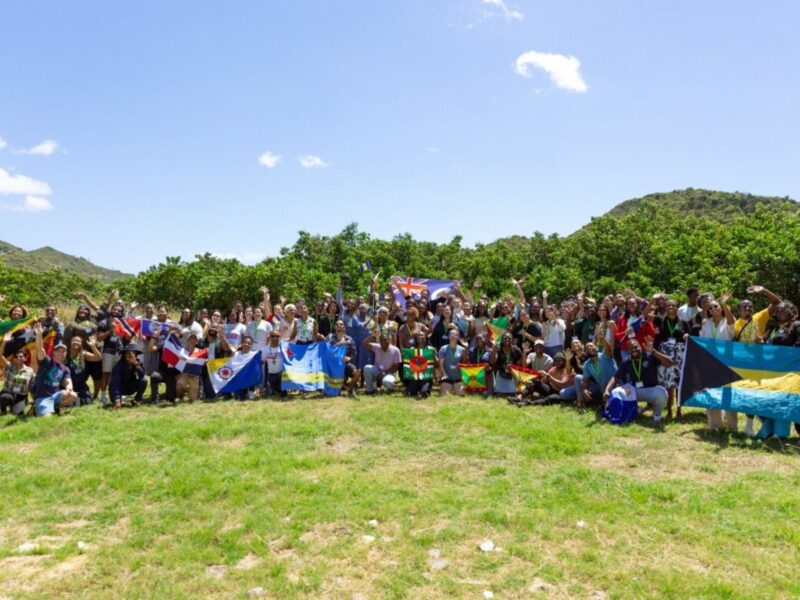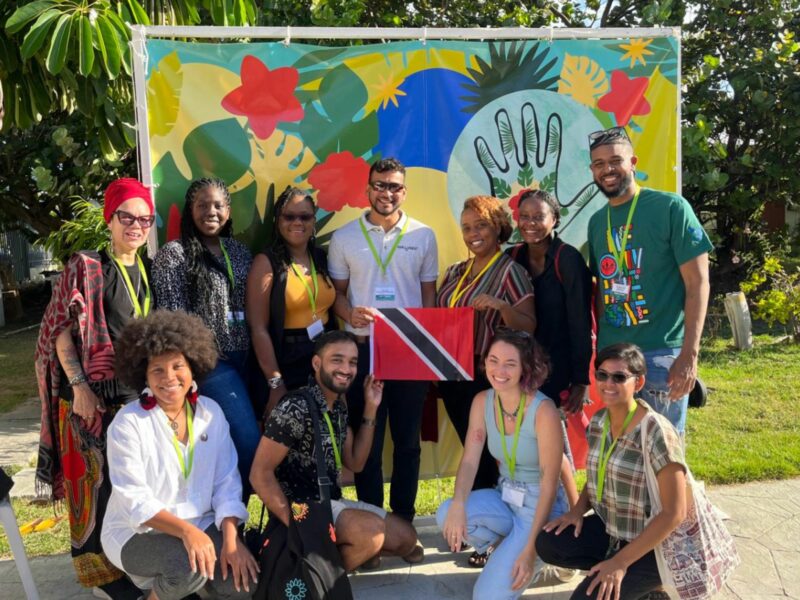Fisherwomen champion gender justice through theatre at Climate Justice Camp Caribbean

Participants in the inaugural Climate Justice Camp Caribbean held in Sint Maarten. Photo by Haus of Hyman Production Company, used with permission.
As I touched down in Sint Maarten on a flight bringing a host of other Caribbean climate leaders to this “friendly island” for the first-ever Climate Justice Camp Caribbean, I was not prepared for how transformative the next few days would be.
Working in the climate space, it is easy to become jaded and question yourself: Am I even making a difference? What does all this work mean if we live in a world where the marginalised are constantly disadvantaged, and everything is set up to keep it this way? Being with the 120 other Caribbean climate justice allies in Sint Maarten was a timely reminder that we cannot give up now.
Led by Roots, via Greenpeace, climate and community leaders from 25 Caribbean countries came together to co-create and collaborate on demands for action, equity, and justice. More than that, the Camp facilitated knowledge and network building, story and skill sharing, sparking friendships and a promise for the burgeoning Caribbean climate justice movement to continue. At the end of the day, humans are social beings, and we require the collective to strengthen this fight.
Agustin Maggio from Argentina, program leader of Roots and lead organiser of the global Climate Justice Camp platform, said, “Building community [is] an essential component in driving the collective action required for radical system change. The bonds and alliances forged in these spaces empower communities to grow, deepening the roots of long-lasting collaboration and solidarity. The Climate Justice Camp is all about recognising that, despite differences, when we come together as a community and share our knowledge, our resources, and our stories, we can create real change.”

Camp participants from Trinidad and Tobago. Photo courtesy Dizzanne Billy, used with permission.
Campers were invited to attend sessions following four specific tracks: Gender and Climate, Adaptation and Resilience, Energy, and Marine Conservation. Among other things, the holistic sessions dealt with the energy sector in the Caribbean, deep sea mining and marine conservation, and how best to assess and address climate impacts.
I found myself drawn to the Gender and Climate track, which started each day with a “wining” meditation — meaning participants got to the front of the room and loosened their hips to the sounds of Alison Hinds’ “Roll it Gyal,” before getting into the heavy issues. Facilitated by CAISO: Sex and Gender Justice from Trinidad and Tobago, The Breadfruit Collective from Guyana, GirlsCARE from Jamaica, and the Global Fund for Women, this track explained the linkages between climate/gender justice and colonialism/eco-imperialism. In sharing anxieties around climate change — fear of losing our islands and our biodiversity; fear of not being able to feed ourselves; fear of tokenism — many were brought to tears.

Participants in Climate Tracker’s media training skill share session ‘Creating an effective Climate Communications Strategy,’ which was facilitated by Dizzanne Billy, working on their communication approaches. Photo by Dizzanne Billy, used with permission.
Climate and gender justice are intricately linked as, thanks to gender inequalities and social norms, climate change disproportionately affects women and marginalised genders. Women often bear the brunt of climate-related disasters with increased caregiving burdens, limited access to resources, and restricted decision-making power.
Addressing gender disparities is crucial for effective climate adaptation and resilience-building efforts, and women's leadership and participation can contribute to more inclusive and sustainable solutions. By promoting gender-responsive policies, challenging harmful stereotypes, and empowering women as agents of change, we can advance both climate and gender justice, creating more equitable and resilient communities for everyone.
It was through this track as well that we became enamoured with the four Barbadian women of the Voices From The Shore Theatre Collective — Michelle Barrow, Sheena Griffith, Margaret Harding, and Sylvia White — who use popular theatre to drive home climate and gender justice messages: “Our climate justice theatre is for the people, by the people, especially marginalised people.”

Members of Barbados’ Voices From The Shore Theatre Collective. Left to right: Sylvia White, Michelle Barrow, Margaret Harding, and Sylvia White. Photo by Dizzanne Billy, used with permission.
Barrow told me that they were inspired to form the group after they realised how far removed government ministers tend to be from the realities of the climate crisis. Voices From The Shore empowers fisherwomen, enabling them to express their concerns while championing climate and gender justice. “We are trying to bring as many people in,” Barrow explained, “because the concerns of the fisherfolk and fisherwomen in the Caribbean need to be shared. We want to educate the public about why fish costs are increasing, the impacts of climate change on fish supply and their livelihoods.”
Climate change disproportionately affects regional fisherwomen through altered ocean conditions, extreme weather events, habitat loss, economic vulnerability, and health impacts. Rising sea levels, ocean acidification, and changing water temperatures disrupt fishing patterns and reduce fish stocks, while more frequent and intense storms negatively affect fishing activities and damage infrastructure.
Coastal erosion and habitat degradation further diminish resources, exacerbating economic insecurity for women who rely on fishing for their livelihoods. Marginalisation, limited access, and unequal participation in decision-making compound their vulnerability. Addressing these challenges requires holistic approaches that enhance resilience, promote sustainable fisheries management, and empower stakeholders in climate adaptation strategies.
Barrow's key Camp takeaway? Climate justice is most important to island nations: “We are small, and we are always treated as tack-ons on the global stage. Whether it's regarding policy development or implementation, the Caribbean is rarely considered or given a seat at the table. So, I have been inspired [to] continue building tables for ourselves. We have to speak for ourselves, we have to agitate the systems for ourselves, because the agitation that we are building is coming from a real place of seeing climate change impacts on our doorstep.”
I wholeheartedly agree. Regional communities are facing unprecedented social, health, and economic challenges as the climate crisis worsens threats of heat waves, extreme weather, and permanent water inundation. The Caribbean is highly vulnerable to the impacts of climate change due to its geographical location, low-lying coastal areas, and dependence on natural resources for livelihoods. Some of the most intense impacts include sea level rise, ocean acidification, changes in rainfall patterns, loss of biodiversity, health impacts, loss of tourism revenue, food insecurity, and migration and displacement.

Caribbean climate leaders Christine Samwaroo (left) and Riddhi Samtani (right), part of the Camp's organising team. Photo by Haus of Hyman Production Company, used with permission.
It is only through building collectives and collaboration across our region that we can truly make a difference and push the needle in favour of society's most marginalised. According to Christine Samwaroo, the intersectional and climate feminist founder of The Breadfruit Collective, “It [was] an honour to bear witness to all the amazing initiatives happening in the Caribbean that are centred on both people and the planet […] We needed this space to share our struggles and find joy in each other. People have taken advantage of the space to plan, coordinate, and collaborate. The camp has left a lasting impact, and it will continue to be a beautiful memory as we renew our call and fight for climate justice, knowing that our struggles are connected, and so is our joy.”
I left Sint Maarten feeling empowered, with a much-needed sense of togetherness and community in this oftentimes isolating world.
The Bridge features personal essays, commentary, and creative non-fiction that illuminate differences in perception between local and international coverage of news events, from the unique perspective of members of the Global Voices community. Views expressed do not necessarily represent the opinion of the community as a whole. All Posts
Categories
Support our work
Global Voices stands out as one of the earliest and strongest examples of how media committed to building community and defending human rights can positively influence how people experience events happening beyond their own communities and national borders.
Please consider making a donation to help us continue this work.







